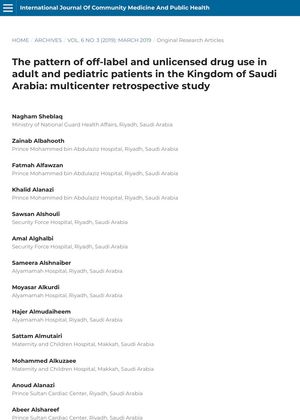The Pattern of Off-Label and Unlicensed Drug Use in Adult and Pediatric Patients in the Kingdom of Saudi Arabia: Multicenter Retrospective Study
February 2019
in “
International Journal of Community Medicine and Public Health
”

TLDR Most off-label drug prescriptions in Saudi Arabia are for adults with depression and diabetes.
In a retrospective study conducted over a 12-month period at six tertiary hospitals in Saudi Arabia, 288 prescriptions were analyzed to evaluate the extent of off-label drug use (OLDU). The study found that 94.42% of off-label prescriptions were due to OLDU by indication, 2.09% were due to OLDU by different age group, and 3.48% were due to other reasons. The majority of the orders (89.05%) were received by adults and geriatrics (≥18 years), while children (1-11 years) received 7.78% of the orders. The most frequently prescribed therapeutic classes were antidepressants (21.88%), antidiabetics (17.71%), and atypical antipsychotics (10.06%). The study concluded that off-label prescribing was most common in adults and geriatrics suffering from depression and diabetes mellitus, and the most common reason for off-label prescription was off-label by indication. The authors called for more studies with larger sample sizes and the development of a policy for OLDU across hospitals.